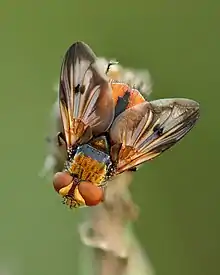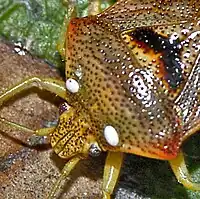Ectophasia crassipennis
Ectophasia crassipennis is a species of 'parasitic flies' of the family Tachinidae, subfamily Phasiinae.[1]
| Ectophasia crassipennis | |
|---|---|
 | |
| Ectophasia crassipennis, male | |
 | |
| Ectophasia crassipennis, female | |
| Scientific classification | |
| Domain: | Eukaryota |
| Kingdom: | Animalia |
| Phylum: | Arthropoda |
| Class: | Insecta |
| Order: | Diptera |
| Family: | Tachinidae |
| Genus: | Ectophasia |
| Species: | E. crassipennis |
| Binomial name | |
| Ectophasia crassipennis (Fabricius, 1794) | |
| Synonyms | |
| |
Description
Adults of Ectophasia crassipennis can reach a length of about 5–9 millimetres (0.20–0.35 in). Their large compound eyes are reddish. In this quite variable species the body may be blackish or orange-brownish. The broad abdomen is flattened and sternite 7 is ventrally folded. The large wings have wide brownish or greyish dots and the cell R5 is opened at the edge.[2][3] It is quite difficult to distinguish this species from the similar Ectophasia oblonga.[4]
Biology
These flies can mostly be encountered from early August through late September feeding on nectar of flowers (especially of Apiaceae and Asteraceae species).
The larvae are parasitic of Hemiptera (Pentatomidae,[2] Acanthosomatidae,[6] Coreidae and Lygaeidae[4] species).
 Eggs of Ectophasia crassipennis on Elasmucha grisea
Eggs of Ectophasia crassipennis on Elasmucha grisea Ectophasia crassipennis, close-up on a wing with detail of veins
Ectophasia crassipennis, close-up on a wing with detail of veins
References
- Biolib
- Aramel.free
- Tachinidae.org
- Naturspaziergang
- Fauna Europaea
- "Diptera Parasitoid Records". Archived from the original on 2014-10-20. Retrieved 2014-10-24.
- James E. O'Hara, Hiroshi Shima, & Chuntian Zhang - "Annotated Catalogue of the Tachinidae (Insecta: Diptera) of China" - Zootaxa 2190 (2009): 1-236